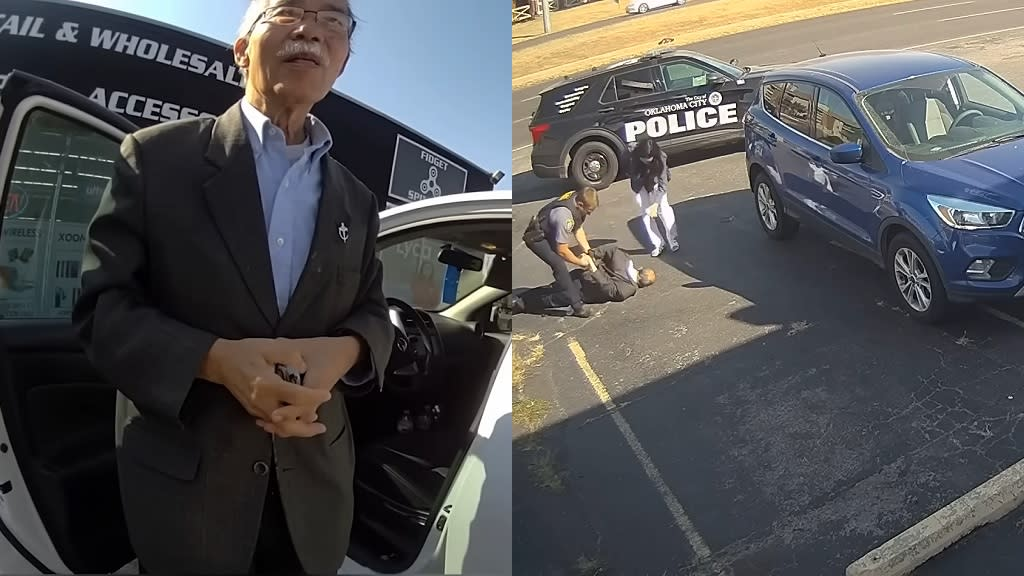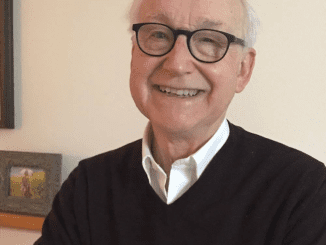Chilling footage has emerged, sparking outrage nationwide, showing a 70-year-old man with bone cancer violently slammed to the ground during a traffic stop in Oklahoma. The incident, captured on body-camera and surveillance footage, has ignited a debate about the use of excessive force, accountability in policing, and implicit bias.
This article dives into the events leading up to the arrest, the aftermath for the victim, and the broader implications for justice and law enforcement reform.

Lich Vu was arrested after arguing with the police. Credit: Oklahoma City Police Department
The Incident: A Routine Stop Turns Violent
On October 27, Oklahoma City police officer Joseph Gibson stopped Lich Vu, a 70-year-old man, for allegedly making an illegal U-turn on NW 39th Expressway. Vu, who was accompanied by his wife, denied the accusation, claiming another driver had hit his car.
In the released body-camera footage, Vu expresses confusion and frustration, saying, “I didn’t U-turn… She hit me, and I got the citation?” Attempting to clarify the situation, Vu exits his vehicle to demonstrate his version of events. Officer Gibson insists that disagreements must be resolved in court, telling Vu, “If you don’t sign this, you go to jail.”
When Vu retorts, “I’m ready to go to jail,” tensions escalate. Gibson briefly interacts with the other driver before returning to Vu. The argument intensifies, with Vu tapping Gibson’s chest and telling him to “shut up.” This small gesture triggers a physical response from the officer.
The Arrest: Excessive Force Captured on Camera
In the footage, Officer Gibson grabs Vu’s arm, twists it behind his back, and forcefully slams him to the ground. Surveillance video from nearby businesses shows Vu’s head striking the pavement as the officer restrains and handcuffs him.
The brutal takedown left Vu with severe injuries, including a brain bleed that required surgery. His family reported that he remains hospitalized, drifting in and out of consciousness but in stable condition.
The Aftermath: Calls for Justice and Accountability
The incident has drawn condemnation from various community leaders and advocacy groups. Thuan Nguyen, president of the Vietnamese American Community of Oklahoma, voiced outrage, calling for Gibson’s immediate termination.
“We don’t want our police department nor our district attorney to take this lightly. We want justice to be served,” Nguyen told NBC News. He also emphasized concerns about implicit bias, pointing out the systemic challenges faced by marginalized communities when dealing with law enforcement.
The Oklahoma City Police Department announced on Facebook that Officer Gibson has been placed on administrative leave pending an internal investigation. “The Oklahoma City Police Department is dedicated to transparency and accountability,” the statement read. “We want our community to know this case is being thoroughly investigated, and the review process will take time to complete.”
The Victim: A 70-Year-Old Man Fighting Bone Cancer
Lich Vu, the victim of this harrowing incident, is not just an elderly man but a cancer patient battling bone cancer—a condition that already compromises his physical health. His family revealed that the trauma from the arrest exacerbated his condition, leading to severe injuries that required urgent medical attention.
The emotional toll on Vu’s family has been significant. They have expressed their anger and disbelief at the officer’s actions, stating that such force was completely unnecessary for an elderly man who posed no physical threat.
The Broader Context: Use of Force and Implicit Bias
This incident is not an isolated event but part of a larger conversation about policing practices in America. The use of force, particularly against marginalized and vulnerable populations, has been a recurring issue.
Advocates argue that Vu’s case highlights implicit bias in the justice system. As Nguyen pointed out, “We are always the last to be heard… Whether we’re at fault or not, our statements are always last.” This sentiment resonates with many in the Vietnamese and broader Asian American communities, who often feel overlooked in matters of justice.
The situation also raises questions about how officers are trained to de-escalate conflicts, particularly with individuals who may be elderly, frail, or in poor health. Critics argue that non-violent resolutions should be prioritized, especially in cases like Vu’s where no immediate threat was present.
The Role of Public Outcry: Driving Change Through Accountability
The release of the footage has sparked widespread public outrage, with many calling for systemic reforms in policing. Social media platforms have amplified these voices, demanding justice for Vu and greater accountability for Officer Gibson’s actions.
Incidents like this underline the importance of body-camera footage in holding law enforcement accountable. Without the visual evidence, Vu’s story might have gone unnoticed, further fueling mistrust between police and the communities they serve.

Steps Forward: Rebuilding Trust and Preventing Future Incidents
To prevent future incidents like this, advocates recommend several measures:
- Enhanced De-Escalation Training: Police officers must be trained to handle tense situations without resorting to unnecessary force, especially with vulnerable populations.
- Community Engagement: Building stronger relationships between law enforcement and marginalized communities can help foster understanding and trust.
- Transparency in Investigations: Police departments must commit to open communication with the public during investigations, ensuring accountability and fairness.
- Independent Oversight: Establishing independent review boards can provide unbiased assessments of police misconduct cases.
Conclusion: Seeking Justice and Change
The violent arrest of Lich Vu is a sobering reminder of the challenges that persist in policing and justice. While the Oklahoma City Police Department has initiated an investigation, the public outcry for justice reflects a deeper frustration with systemic issues.
Vu’s story serves as both a call for accountability and a rallying cry for change. As the investigation unfolds, it’s crucial to remember that justice extends beyond one case—it’s about creating a system where every individual, regardless of age, health, or background, is treated with dignity and fairness.


